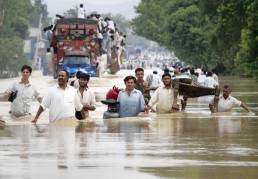A Glance into Pakistan's Health Crisis
Author: Hafsa Aslam
In Pakistan, one of the most fundamental aspects of human wellbeing is also one of the most overlooked. Throughout Pakistan’s history, political parties, civil and military have ultimately failed in making health a priority. With regular cases of malaria and hepatitis, meaningful discussions about its causes and future health policies are virtually absent. Alarming health indicators remain present and constantly hinder the physical and cognitive success of the underprivileged class.

Failure to address this issue has induced detrimental results. The mortality rate of infants is 66 per a thousand births, while the maternal mortality is 170 per every 100,000 births, which is twice as deadly than neighboring countries – Bangladesh and Sri Lanka. Pakistan has constantly struggled with poor healthcare. Recent floods have exponentially worsened the current situation. Without proper funding and policy enforcement, Pakistan’s health and economic systems are ill-equipped to handle the burden of infectious diseases such as dengue, typhoid and hepatitis and non-communicable diseases. Ultimately, the economic crisis negatively impacts the healthcare system.
Pakistan’s spiraling health crisis is sparking a public health crisis. The recent, soaring inflation prices have only exacerbated the situation with shortages of medical supplies and equipment. In an attempt to protect foreign reserves, authorities placed heavy import restrictions, straining the medical and raw materials stocks. As patients suffer in hospitals, pharmaceutical companies are forced to halt production with absent imported raw materials. Most drug manufacturing industries are taxed by the heavy fuel costs, transportation charges, and sharp devaluation of the rupee. This situation has led to severe shortages of life-saving drugs needed to treat cancer, diabetes, epilepsy, and heart conditions. These shortages are the result of rupee devaluation, increased cost of raw materials, and reduced production from pharmaceutical companies, leading some people to pay twice as much for medications such as insulin on the black market while others are left without access to critical treatments.

From the low supplies, doctors are forced to postpone surgeries, while customers unable to pay for the high costs in private healthcare remain in pain. Behind the dismal numbers lie heartbreaking stories of lives ruined and cut short due to the unavailability of affordable and quality healthcare.
Pakistan’s deteriorating health system is a reflection of the mere 0.9pc of GDP on health expenses. However Pakistan’s financial disabilities as a developing economy provides little to no excuse. Developing countries such as Thailand and Mexico have made outstanding progress in their healthcare system and policies through their political commitment.

These low-income countries have made significant advancement through improving healthcare services and providing insurance. Furthermore, an activist public can play a crucial role in mobilizing public health systems to serve the needs of the population. Despite the evident declining economic crisis in Pakistan, the crumbling healthcare system may easily be avoided through political priority in improving healthcare services to the whole public. Through education and awareness of healthcare policies and citizen’s advocacy, we must not accept an inevitable, failing healthcare rather work to make health the central political issue.
